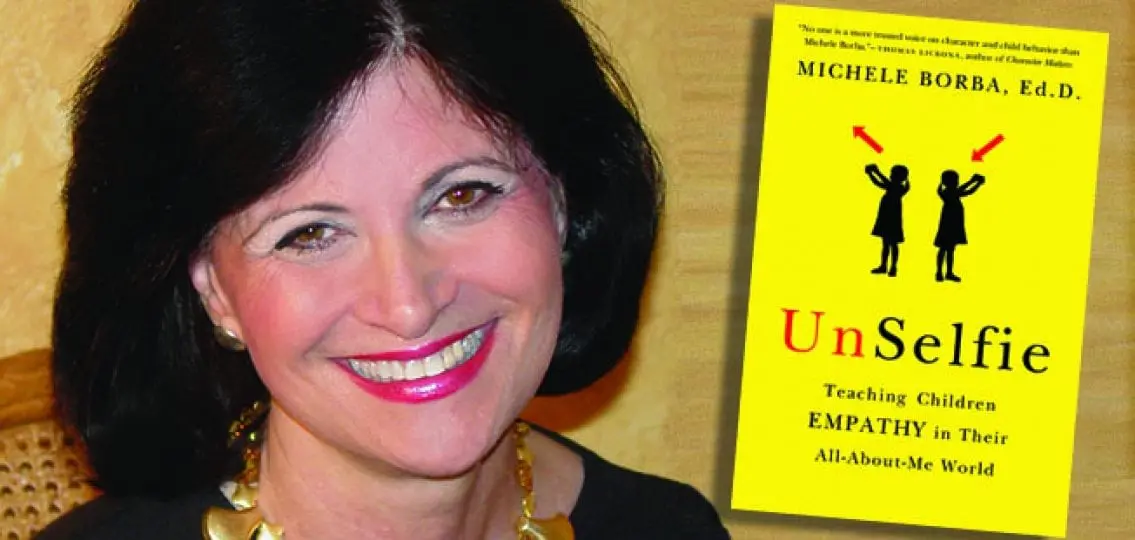Author and expert Michele Borba, Ed.D., has written numerous books on children, teens, and parenting. Her practical, research-based advice is the result of a career spent working with over one million parents and educators worldwide. In her new book, UnSelfie: Teaching Children Empathy in Their All-About-Me World, Dr. Michele Borba addresses narcissism and how parents can combat it by building empathy in their teens.
Q: Do you think that this generation is more narcissistic than others?
Borba: Yes. The bottom line is empathy is lying dormant. Empathy can be cultivated, but we aren’t doing that intentionally enough as parents. Our definition of success has become IQ, grades, and SATs, with less focus on kindness. What we are doing is raising our kids to stay in the ‘me’ stage, and we need to start helping them think ‘we’ not ‘me.’
Q: How did this generation become the “selfie” generation?
Borba: The culture itself has dramatically changed, and many variables are triggering it. Kids are always plugged in, so they’re facing screens as opposed to one another. Also, role models have moved away from Mr. Rogers toward Kim Kardashian.
Q: Isn’t some sense of self-absorption expected during the teen years?
Borba: Yes, but in some cases, teens can be more self-absorbed because they’re stressed. This is a tough time to be a teen. Stress is at an all-time high, and what happens is you dial down your empathy because you’re in survival mode. You’ve got to try to protect yourself. Teenagers also start to lose empathy because they’re so concerned and preoccupied about what others are thinking about them. They’re trying to form an identity. That said, we shouldn’t let them get away with being uncaring and unkind. We need to call them on it. And we must teach our teens healthy ways to manage stress.
Q: Can we help our teens be more empathic when they’re overwhelmed?
Borba: Our teens do have empathy. They feel it, but they can’t reach out because they’re in self-protection mode. Very often what happens is they see that other person’s pain, and then the guilt sets in because they don’t have the strength to be able to do something about it.
You can tell them, “It doesn’t have to be in the here and now. You can always call your friend later, or you can text them and say, ‘Hey, are you okay?’ It can be hard to say that in front of everybody.”
The other thing is that teens tell us they’re developing compassion fatigue. They’re seeing nothing but doom and gloom stuff. In the olden days, we could turn off the TV and protect them. The smaller the screen size, the less likely we can protect them. They’re seeing ISIS beheadings, they’re seeing live war feeds from Iraq. That’s going to make a difference on a kid’s empathy.
Q: How do we counteract that reality?
Borba:Start showing them the good part of the world. They need to hear elevating experiences, like kids on the back page of a newspaper who are making a difference.
Q: Do “required community service hours” teach empathy?
Borba: Many parents see service hours as a boost to the college resume. But service, if it’s going to increase empathy, must be something important to the teen. Say your daughter loves soccer. She might be the perfect person to go out and help underprivileged kids who can’t afford soccer coaches. The right volunteer experience has the potential to be transformational, rather than just something that looks good on a resume.
Q: Can you tell me your favorite story from your UnSelfie interviews?
Borba: Kevin Curwick, a football captain in Osseo, Minnesota, got so tired of cyberbullying and meanness at school he decided to start an anonymous Twitter account called Osseo Nice Things. He sent out the first tweet to one kid who was having a really bad day, and within seconds the kid tweeted back, “Thank you,” and tweeted the same kind of thing about another kid. Kids started following him, and copying his positive social media approach and tweeting nice things as well, and it spread to countries around the world.




